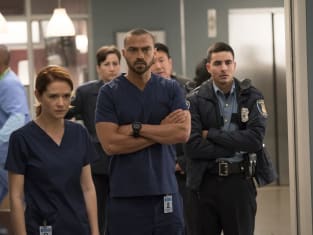
Grey's Anatomy
Thursdays 9:00 PM on ABCGrey's Anatomy Season 14 Episode 10: "Personal Jesus" Quotes
'Eloi, Eloi, lama sabachthani?' That's what Jesus said on the cross before he died. 'My God, my God, why have you forsaken me?' Job asked the question too. But he kept the faith. And what did he get for it? Replacement children. PTSD. Was it worth it to have been a faithful servant? Or would it have been better to just curse God's name from the beginning? Where was God throughout all of Job's suffering and pain? He was winning a bet with Satan. Makes you wonder where he is through all of the unfairness, inequity, and cruelness in the world. Where is he now?
April's Voiceover
In the course of one day, Job received four messages. Each with separate news that his livestock, servants, and 10 children had all died. He continued to be a faithful servant. He still prays to God. He persevered. Job's faith was tested, and he passed the test. And for his faith, God rewarded Job with twice of what he had before.
April's Voiceover
JACKSON: Look at him protecting us from a 12-year-old strapped into a CT. That is our tax dollars at work.
APRIL: He's just doing his job.
JACKSON: That's what they always say. What about the cop who shot him? Was he just doing his job?
APRIL: I've seen soldiers get so wound up with stress they shoot first before they even know what they're shooting at.
BAILEY: You think that's OK?
APRIL: No, of course not. Those are war zones. This was an upper-class neighborhood.
JACKSON: Yeah, those can be the worst ones for us. I grew up in those neighborhoods. Just being there is suspicious. Constantly stopped for fitting the description. I remember I was walking, carrying these speakers for my friend, and these cops pull up on me, tires screeching, yelling at me, guns drawn, slammed me into the car, handcuffed me. I was one block from my front door.
APRIL: You never told me that.
JACKSON: It doesn't really come up until it does.
Officer: I'm sorry. We still need a statement.
April: My statement is that a little boy was at home when a fellow officer shot and killed him. You can't be out there shooting people because you're afraid. How am I supposed to have faith in a system like that?
Everything we're saying to you, we're saying because we want you to come home again. You are amazing. You are perfect. And we want you to stay that way.
Miranda
Bailey: 12-years-old. In his own house. It's time to give Tuck the talk.
Ben: I know.
OFFICER: It was a high-pressure situation. The officer made a judgment call.
JACKSON: No. There was no judgment in that call, it was just a reaction. You see skin color, we all do, but the reaction that you give to a white kid versus a brown kid in a split second...that's a measurable, fixable difference. Bias is human. You have guns. You're using guns. So yours is lethal.
OFFICER 2: We aren't racists. We just never know who has a gun.
JACKSON. I didn't say anything about racist. I said bias, and lucky for us, bias is fixable. You have protocols in place, those can be adjusted. You can fix it, or you can keep pretending that it doesn't exist at all. Kids are dying. This kid is dead. For what? So many people who look just like him are dying. For what?
Carina: Everybody does it. Everyone in this room.
Richard: Let's not.
Carina: Well, I do it, and I'm not ashamed.
Patient: You have to get out now.
Jennie: Some very broken part of me is still in love with you, but let me be clear. I am never speaking to you again unless it's from a witness stand.
Paul: You stupid bitch!
You should probably call your office and tell them that you're going to be gone for a few days. More like ten to twenty years.
Jennie
April: Karen is terrific.
Matthew: Yeah. Best thing that ever happened to me. I guess I have you to thank for that.
They took his childhood today. He's never going to be the same.
Jackson









